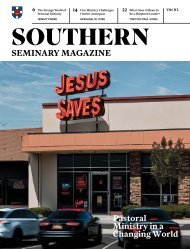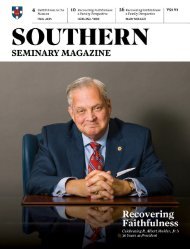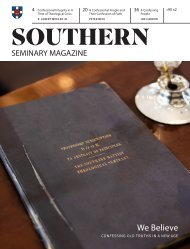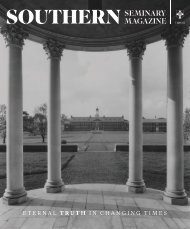Southern Seminary Magazine (Vol 90.1) The Light of Truth: Apologetics in the 21st Century
You also want an ePaper? Increase the reach of your titles
YUMPU automatically turns print PDFs into web optimized ePapers that Google loves.
play<strong>in</strong>g <strong>of</strong>fense<br />
Mak<strong>in</strong>g Sound Arguments<br />
Much <strong>of</strong> my role as an ethics pr<strong>of</strong>essor at <strong>Sou<strong>the</strong>rn</strong> <strong>Sem<strong>in</strong>ary</strong><br />
is conv<strong>in</strong>c<strong>in</strong>g students that on <strong>the</strong> most controversial<br />
issues <strong>of</strong> our day, <strong>the</strong> best answers are not only<br />
Christian answers, but Christian answers are also <strong>the</strong><br />
most coherent answers one could <strong>of</strong>fer to <strong>the</strong>ir secular<br />
neighbor. To do public apologetics—to make arguments<br />
<strong>in</strong> hopes <strong>of</strong> expla<strong>in</strong><strong>in</strong>g and persuad<strong>in</strong>g—requires<br />
us as Christians to understand <strong>the</strong> relationship<br />
between faith and reason. We must understand <strong>the</strong><br />
reasonableness <strong>of</strong> <strong>the</strong> ethics we hold as Christians if<br />
we hope to make arguments that would hope to see<br />
<strong>in</strong>dividuals converted and culture more humane.<br />
I’ll use a famous illustration to expla<strong>in</strong> my po<strong>in</strong>t. In his<br />
Letter from a Birm<strong>in</strong>gham Jail, Mart<strong>in</strong> Lu<strong>the</strong>r K<strong>in</strong>g, Jr.<br />
made a pr<strong>of</strong>ound argument for overturn<strong>in</strong>g racist laws.<br />
But it was not just <strong>the</strong> conclusion he reached that we<br />
should agree with; it was how he got <strong>the</strong>re, too. His argument,<br />
which was <strong>in</strong>tended to be publicly accessible and<br />
persuasive for prick<strong>in</strong>g consciences and chang<strong>in</strong>g laws,<br />
appealed to <strong>the</strong> Christian natural law tradition. Cit<strong>in</strong>g<br />
August<strong>in</strong>e and Thomas Aqu<strong>in</strong>as, K<strong>in</strong>g argued that “an<br />
unjust law is not law at all.” He wrote:<br />
How does one determ<strong>in</strong>e whe<strong>the</strong>r a law is just or unjust?<br />
A just law is a manmade code that squares with<br />
<strong>the</strong> moral law or <strong>the</strong> law <strong>of</strong> God. An unjust law is a<br />
code that is out <strong>of</strong> harmony with <strong>the</strong> moral law. To put<br />
it <strong>in</strong> <strong>the</strong> terms <strong>of</strong> St. Thomas Aqu<strong>in</strong>as: An unjust law<br />
is a human law that is not rooted <strong>in</strong> eternal law and<br />
natural law. Any law that uplifts human personality is<br />
just. Any law that degrades human personality is unjust.<br />
All segregation statutes are unjust because segregation<br />
distorts <strong>the</strong> soul and damages <strong>the</strong> personality.<br />
What K<strong>in</strong>g meant was that a law that purposefully<br />
harms does not reta<strong>in</strong> <strong>the</strong> actual power to command<br />
obedience; it is thus not true law. Justice can never entail<br />
<strong>the</strong> denial <strong>of</strong> what is owed to persons. That is, well,<br />
unjust. A law, after all, is a standard or measurement that<br />
obligates <strong>in</strong>dividuals to obey its precepts on <strong>the</strong> basis that<br />
<strong>the</strong> precept advances some rational good. All truly sound<br />
laws will reflect an ord<strong>in</strong>ance <strong>of</strong> reason that directs persons<br />
to <strong>the</strong>ir good. To say a law is reasonable means it<br />
accomplishes justice. But a law that obstructs or thwarts<br />
<strong>the</strong> good cannot be an actual law because it is unjust.<br />
K<strong>in</strong>g argues that not only are racial supremacy laws <strong>in</strong><br />
violation <strong>of</strong> Christian <strong>the</strong>ology, <strong>the</strong>y violate all rational<br />
grounds for justice as well. A true law reflects <strong>the</strong> pr<strong>in</strong>ciple<br />
<strong>of</strong> justice. A law that does violence to one’s neighbor<br />
is wrong because we can grasp <strong>the</strong> harm <strong>the</strong> law perpetrates.<br />
We would ourselves not want to be on <strong>the</strong> receiv<strong>in</strong>g<br />
end <strong>of</strong> that unjust law’s application. This expla<strong>in</strong>s <strong>the</strong><br />
logic beh<strong>in</strong>d <strong>the</strong> Golden Rule <strong>in</strong> Luke 6:31. Jesus assumes<br />
that any action is just toward o<strong>the</strong>rs <strong>in</strong>s<strong>of</strong>ar as it is <strong>the</strong><br />
type <strong>of</strong> action we would want applied to ourselves. No<br />
one <strong>in</strong> <strong>the</strong>ir right m<strong>in</strong>d goes look<strong>in</strong>g to harm <strong>the</strong>mselves<br />
for no good cause, so likewise, any law that harms o<strong>the</strong>rs<br />
cannot obta<strong>in</strong> <strong>the</strong> grounds <strong>of</strong> justice, ei<strong>the</strong>r. Crucially,<br />
it’s worth notic<strong>in</strong>g that K<strong>in</strong>g does not pit reason aga<strong>in</strong>st<br />
“Much <strong>of</strong> my role as an ethics pr<strong>of</strong>essor<br />
at <strong>Sou<strong>the</strong>rn</strong> <strong>Sem<strong>in</strong>ary</strong> is conv<strong>in</strong>c<strong>in</strong>g<br />
students that on <strong>the</strong> most controversial<br />
issues <strong>of</strong> our day, <strong>the</strong> best answers<br />
are not only Christian answers, but<br />
Christian answers are also <strong>the</strong> most<br />
coherent answers one could <strong>of</strong>fer to<br />
<strong>the</strong>ir secular neighbor.”<br />
26 <strong>the</strong> sou<strong>the</strong>rn baptist <strong>the</strong>ological sem<strong>in</strong>ary






